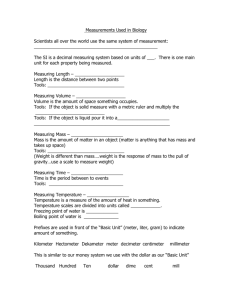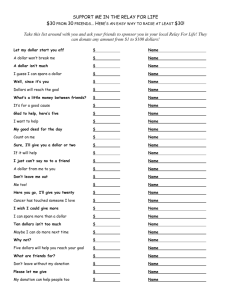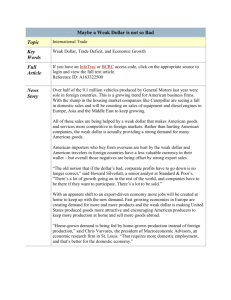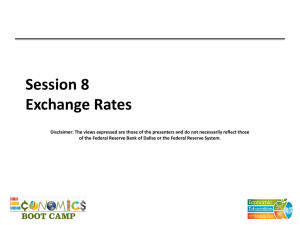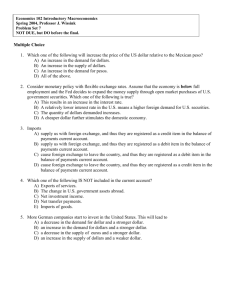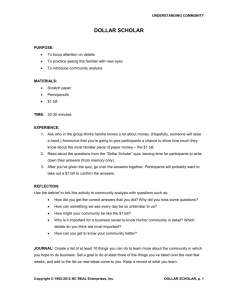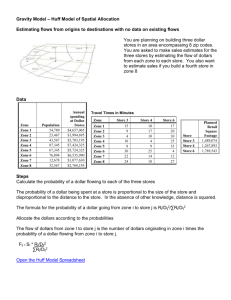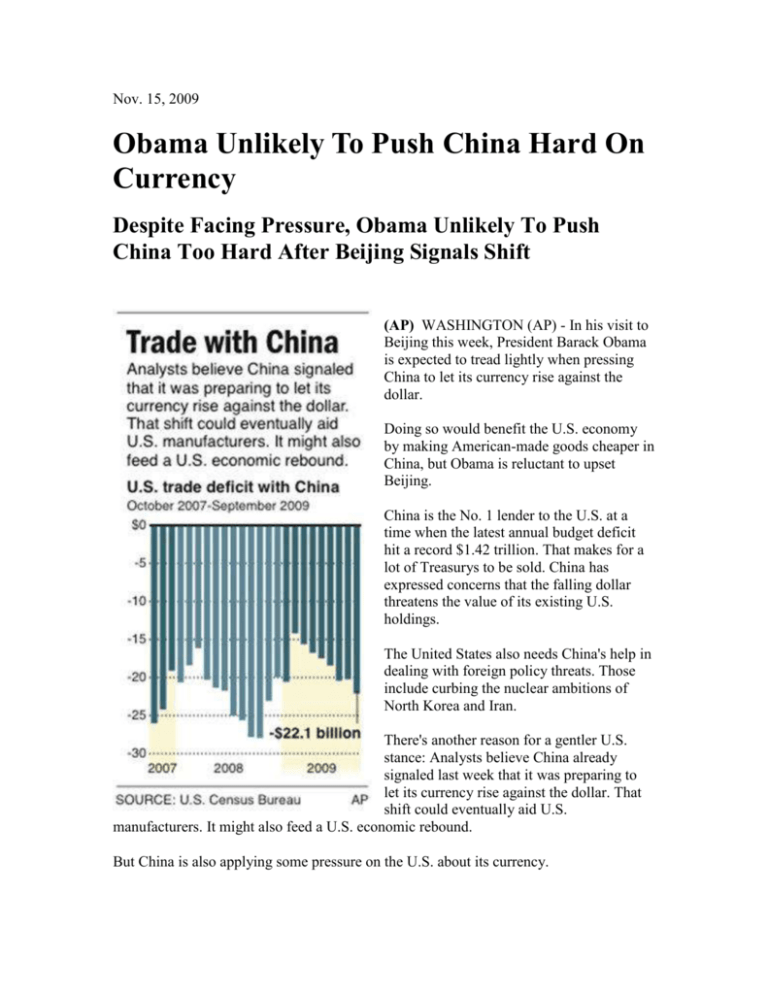
Nov. 15, 2009
Obama Unlikely To Push China Hard On
Currency
Despite Facing Pressure, Obama Unlikely To Push
China Too Hard After Beijing Signals Shift
(AP) WASHINGTON (AP) - In his visit to
Beijing this week, President Barack Obama
is expected to tread lightly when pressing
China to let its currency rise against the
dollar.
Doing so would benefit the U.S. economy
by making American-made goods cheaper in
China, but Obama is reluctant to upset
Beijing.
China is the No. 1 lender to the U.S. at a
time when the latest annual budget deficit
hit a record $1.42 trillion. That makes for a
lot of Treasurys to be sold. China has
expressed concerns that the falling dollar
threatens the value of its existing U.S.
holdings.
The United States also needs China's help in
dealing with foreign policy threats. Those
include curbing the nuclear ambitions of
North Korea and Iran.
There's another reason for a gentler U.S.
stance: Analysts believe China already
signaled last week that it was preparing to
let its currency rise against the dollar. That
shift could eventually aid U.S.
manufacturers. It might also feed a U.S. economic rebound.
But China is also applying some pressure on the U.S. about its currency.
On Sunday, China's top bank regulator said the weak dollar and low interest rates were
distorting global asset prices and posing an "insurmountable risk to the recovery of the
world economy," according to a transcript of a speech he made at a financial forum in
Beijing.
The regulator, Liu Mingkang, said the declining dollar and low interest rates were
encouraging a "massive" U.S. dollar carry trade - the practice of borrowing money at low
rates in one currency to invest in assets in another currency that offer a higher return.
Analysts say China will likely wait months before tweaking the yuan-dollar exchange
rate, which now stands at about 6.8 yuan to the dollar. Beijing doesn't want to appear to
be bowing to U.S. pressure. Even then, it will take time for the U.S. to benefit.
Mark Zandi, chief economist at Moody's Economy.com, says he expects the Chinese to
begin allowing the yuan to rise against the dollar by next spring, at a rate of about 5
percent a year.
At that pace, it would take until around 2015 for the two currencies to be in balance - a
process Zandi said could help narrow the U.S. trade gap with China, which last year hit
$268 billion.
U.S. manufacturers won't likely be satisfied. They want the administration to push
Beijing to raise the yuan's value further and faster. Their exports have been hurt by
China's move last year to peg the yuan to the dollar. They contend the yuan is
undervalued by up to 40 percent.
From 2005 to 2008, the Chinese had allowed the yuan to rise about 20 percent against the
dollar. It started pegging its currency to the dollar in mid-2008, once the global recession
began hurting China's exports.
Normally, a low dollar would make U.S. goods cheaper for hundreds of millions of
Chinese consumers. But since the Chinese have kept the yuan tightly linked to the dollar,
U.S. exporters haven't been able to capitalize.
"Obama will raise the currency issue (during his visit), but he is in no position to push the
Chinese simply because he lacks any levers to make the Chinese do something they do
not want to do," said Eswar Prasad, an economist at Cornell University and senior fellow
at the Brookings Institution.
China's central bank made its subtle yet surprising shift in the wording of its exchangerate policy on Thursday. In the arcane language that governs the $3-trillion-a-day
currency markets, many analysts read the shift as a signal that Beijing was getting ready
to let the yuan resume rising against the dollar.
The dollar has been sliding in value against many major currencies. U.S. exports to
Europe have benefited, because the dollar has fallen about 18 percent against the euro
since early March.
And since the Chinese have linked their currency to the dollar, the dollar's fall has
benefited them, too. It's made Chinese products cheaper in Europe and elsewhere where
currencies have risen against the dollar. If Beijing let the yuan rise, those Chinese goods
would become more expensive.
For now, a weak yuan isn't all bad for the U.S. It's meant a break for American
consumers and retailers, such as Wal-Mart, that buy goods imported from China.
But many countries have complained about the weaker dollar and China's close link to it.
Some, such as Thailand, South Korea and Russia, have sought to stem the dollar's rise
against their currencies by buying dollars.
American manufacturing groups blame the low yuan for contributing to the loss of 5.6
million manufacturing jobs in the past decade. During that time, America's trade gap with
China has soared.
"The rising trade deficit is an ominous sign for an economic recovery anytime soon,"
Scott Paul of the Alliance for American Manufacturing said after the government
reported Friday that the deficit with China jumped sharply in September.
The issue has riled some on Capitol Hill at a time when the U.S. unemployment rate has
hit a 26-year high of 10.2 percent and lawmakers are under pressure to help create jobs.
Legislation in the House and Senate would allow for tariffs on Chinese goods if Beijing's
currency policies don't change.
Treasury Secretary Timothy Geithner, at the Asia-Pacific Economic Cooperation finance
meetings in Singapore last week, repeated his mantra that "it's very important to the
United States that we have a strong dollar."
The administration has done nothing to halt the dollar's slide. Some have seen that as a
signal that the U.S. feels a weak dollar relative to major currencies, other than the yuan,
helps U.S. exports.
But with the United States reliant on foreigners to finance nearly $8 trillion in publicly
held debt, it can't openly back a weaker dollar. Doing so would cause investors to dump
dollars. The dollar would sink, U.S. interest rates would likely surge and the fledgling
U.S. economic recovery could risk collapse.
Many economists contend that even if China let its currency rise sharply against the
dollar, Beijing would still enjoy trade advantages. Those include its low-wage work force
and barriers it's erected to limit imports of U.S. and other foreign-made goods.
Other factors contribute to the trade gap. China is a high-saving country. It relies on
exports to power growth. By contrast, U.S. consumers have driven global growth for
decades with high spending and low savings.
"Achieving global balance sounds great in theory, but there are a lot of skeptics out there
who wonder what the enforcement mechanism will be," said Nicholas Lardy, an
economist at the Peterson Institute for International Economics in Washington.
Copyright 2009 The Associated Press. All rights reserved. This material may not be
published, broadcast, rewritten or redistributed.
1. Why is China so concerned about the exchange rate the United States? And what does
the value of the dollar have to do with it?
2. What steps can a government take to control the value of their dollar (much like China
over the past few years)?
3. China's top bank regulator, Liu Mingkang, said the declining dollar and low interest
rates were encouraging a U.S. dollar carry trade – What does he mean?
4. Many analysts suggest that Beijing iss getting ready to let the yuan resume rising
against the dollar – is this good or bad for US businesses? Why? It it good or bad for
China?

